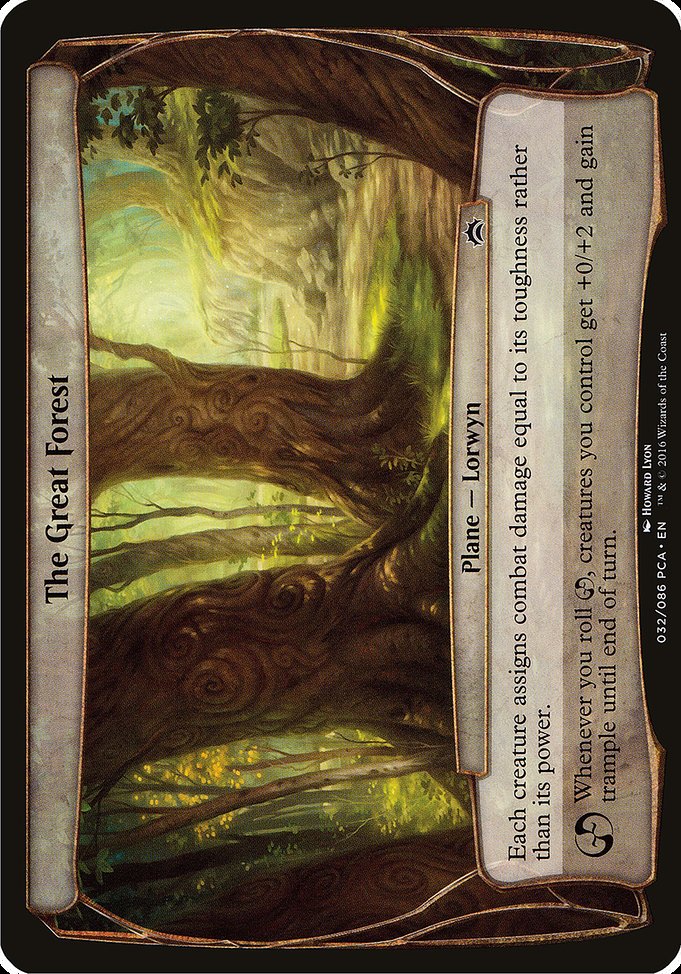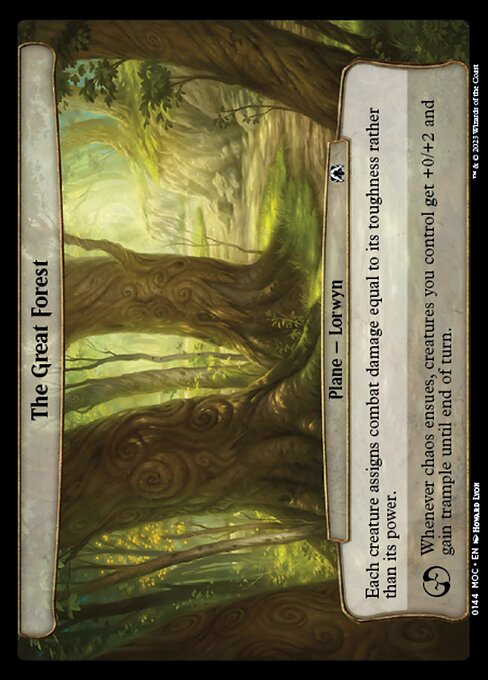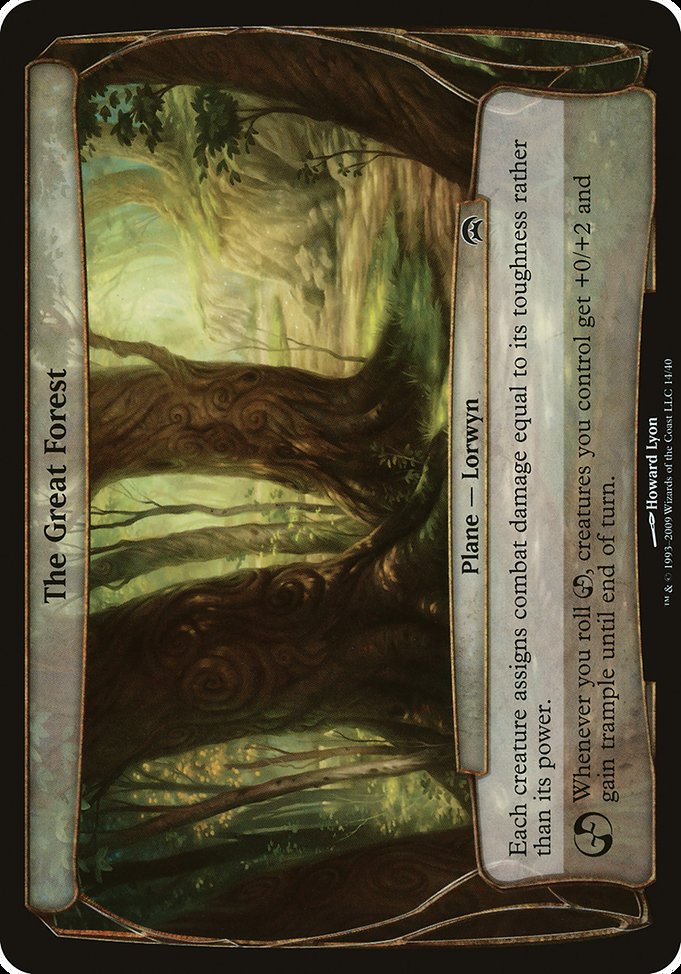standard
future
historic
gladiator
pioneer
explorer
modern
legacy
pauper
vintage
penny
commander
brawl
historicbrawl
alchemy
paupercommander
duel
oldschool
premodern
Rulings
A face-up plane card that’s turned face down becomes a new object with no relation to its previous existence. In particular, it loses all counters it may have had.
If an ability of a plane refers to “you,” it’s referring to whoever the plane’s controller is at the time, not to the player that started the game with that plane card in their deck. Many abilities of plane cards affect all players, while many others affect only the planar controller, so read each ability carefully.
The controller of a face-up plane card is the player designated as the “planar controller.” Normally, the planar controller is whoever the active player is. However, if the current planar controller would leave the game, instead the next player in turn order that wouldn’t leave the game becomes the planar controller, then the old planar controller leaves the game. The new planar controller retains that designation until they leave the game or a different player becomes the active player, whichever comes first.
The Great Forest’s first ability means, for example, that a 2/3 creature will assign 3 damage in combat instead of 2.
A plane card is treated as if its text box included “When you roll {PW}, put this card on the bottom of its owner’s planar deck face down, then move the top card of your planar deck off that planar deck and turn it face up.” This is called the “planeswalking ability.”
The Great Forest’s first ability doesn’t actually change creatures’ power; it changes only the value of the combat damage they assign. All other rules and effects that check power or toughness use the real values.
If an ability of a plane refers to “you,” it’s referring to whoever the plane’s controller is at the time, not to the player that started the game with that plane card in their deck. Many abilities of plane cards affect all players, while many others affect only the planar controller, so read each ability carefully.
The controller of a face-up plane card is the player designated as the “planar controller.” Normally, the planar controller is whoever the active player is. However, if the current planar controller would leave the game, instead the next player in turn order that wouldn’t leave the game becomes the planar controller, then the old planar controller leaves the game. The new planar controller retains that designation until they leave the game or a different player becomes the active player, whichever comes first.
The Great Forest’s first ability means, for example, that a 2/3 creature will assign 3 damage in combat instead of 2.
A plane card is treated as if its text box included “When you roll {PW}, put this card on the bottom of its owner’s planar deck face down, then move the top card of your planar deck off that planar deck and turn it face up.” This is called the “planeswalking ability.”
The Great Forest’s first ability doesn’t actually change creatures’ power; it changes only the value of the combat damage they assign. All other rules and effects that check power or toughness use the real values.
Rulings
A face-up plane card that’s turned face down becomes a new object with no relation to its previous existence. In particular, it loses all counters it may have had.
If an ability of a plane refers to “you,” it’s referring to whoever the plane’s controller is at the time, not to the player that started the game with that plane card in their deck. Many abilities of plane cards affect all players, while many others affect only the planar controller, so read each ability carefully.
The controller of a face-up plane card is the player designated as the “planar controller.” Normally, the planar controller is whoever the active player is. However, if the current planar controller would leave the game, instead the next player in turn order that wouldn’t leave the game becomes the planar controller, then the old planar controller leaves the game. The new planar controller retains that designation until they leave the game or a different player becomes the active player, whichever comes first.
The Great Forest’s first ability means, for example, that a 2/3 creature will assign 3 damage in combat instead of 2.
A plane card is treated as if its text box included “When you roll {PW}, put this card on the bottom of its owner’s planar deck face down, then move the top card of your planar deck off that planar deck and turn it face up.” This is called the “planeswalking ability.”
The Great Forest’s first ability doesn’t actually change creatures’ power; it changes only the value of the combat damage they assign. All other rules and effects that check power or toughness use the real values.
If an ability of a plane refers to “you,” it’s referring to whoever the plane’s controller is at the time, not to the player that started the game with that plane card in their deck. Many abilities of plane cards affect all players, while many others affect only the planar controller, so read each ability carefully.
The controller of a face-up plane card is the player designated as the “planar controller.” Normally, the planar controller is whoever the active player is. However, if the current planar controller would leave the game, instead the next player in turn order that wouldn’t leave the game becomes the planar controller, then the old planar controller leaves the game. The new planar controller retains that designation until they leave the game or a different player becomes the active player, whichever comes first.
The Great Forest’s first ability means, for example, that a 2/3 creature will assign 3 damage in combat instead of 2.
A plane card is treated as if its text box included “When you roll {PW}, put this card on the bottom of its owner’s planar deck face down, then move the top card of your planar deck off that planar deck and turn it face up.” This is called the “planeswalking ability.”
The Great Forest’s first ability doesn’t actually change creatures’ power; it changes only the value of the combat damage they assign. All other rules and effects that check power or toughness use the real values.
Votre collection ? vos decks ?
Envie de gérer votre collection et/ou créer des decks ?



 0
0
 0.40€
0.40€
